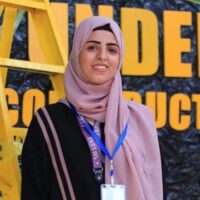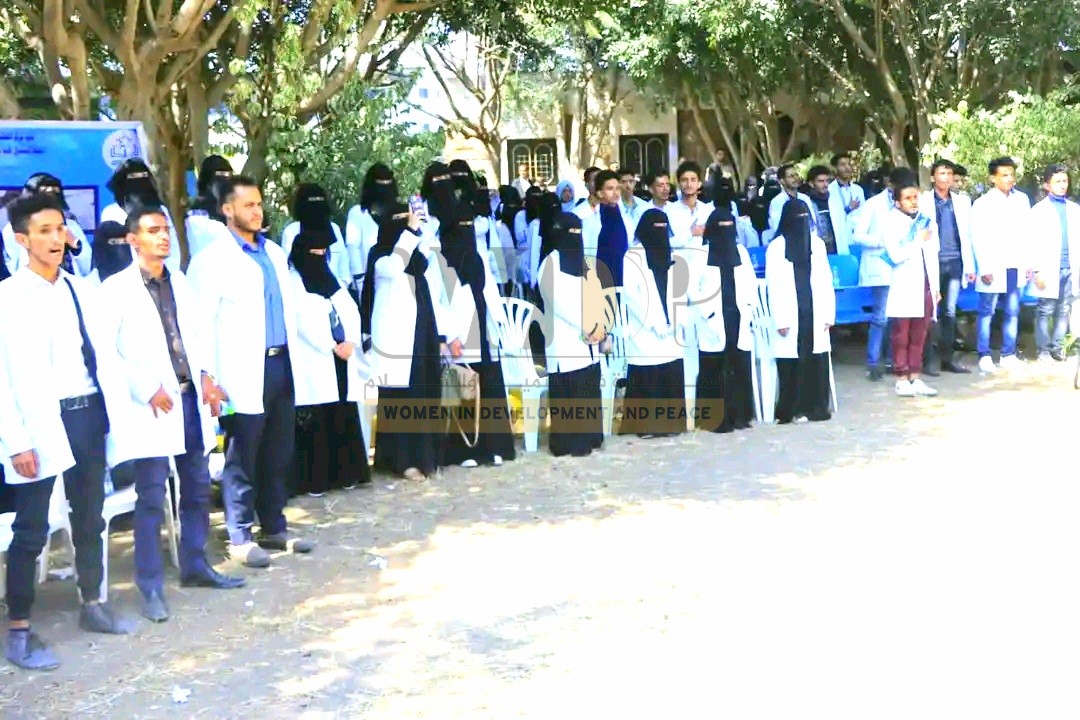Yasmine Abdulhafeez – Women in Development and Peace
Yemeni women have successfully entered numerous fields previously considered exclusive to men. Through their experiences in various domains, they have proven their ability to achieve remarkable accomplishments in diverse scientific and technological areas. They possess unwavering determination and the resilience to overcome societal, economic, and other challenges.
Over the years, Yemeni higher education institutions have played a pivotal role in empowering women and strengthening their academic contributions. By opening new horizons in science, technology, engineering, and mathematics (STEM) fields, these institutions have affirmed the aspirations of Yemeni women to actively participate in building their society.
Moreover, numerous universities, colleges, and institutes have organized workshops, training courses, and seminars across various disciplines. These initiatives equip female students with valuable skills and knowledge in diverse scientific and technical fields, fostering their abilities and expertise.
In May 2024, a workshop concluded at the Faculty of Education, University of Al-Hodeidah, focusing on reviewing and approving the specifications documents for master’s programs in the Department of Mathematics and Physics. The university is committed to developing these specializations, enhancing the educational process, and qualifying competent professionals in all scientific fields, including mathematics, physics, and other areas of focus for the university’s development and advancement.
In February 2018, the Faculty of Engineering at the University of Al-Hodeidah signed an agreement to employ ten outstanding students from the Department of Food Industries Engineering. Notably, this group included five female students who secured positions at the Red Sea Mills in the city.
The Field of Science and Technology
Science and Technology Center at the University of Aden stands as a bridge connecting academia and society. Established in 1997 under the leadership of Dr. Rukhsana Muhammad Ismail, who holds a PhD in Petrochemical Technology, the center plays a pivotal role in aligning academic endeavors with societal needs.
The center harnesses the scientific expertise of faculty members, both men and women, to serve the community. By forging partnerships with production and service institutions, it strives to direct scientific research toward addressing pressing issues facing Yemeni society. The ultimate goal is to translate research findings into practical applications that contribute to sustainable development.
Furthermore, the center seeks to align scientific research with the needs of Yemeni society by conducting studies and research in vital areas such as agriculture, water, and energy. It leverages local expertise to develop innovative solutions to the challenges confronting the nation, working to transform scientific knowledge into tangible outcomes through the implementation of research projects that serve sustainable development in Yemen.
The center conducts applied scientific research in diverse fields, with a focus on national priorities such as food security and renewable energy. It establishes partnerships with international scientific institutions to exchange expertise and knowledge, capitalizing on the latest scientific and technological advancements. Moreover, it strives to transfer modern technology to the industrial and agricultural sectors, enhance the competitiveness of the national economy, disseminate scientific and technological awareness among community members, and foster a culture of scientific research and innovation.
Despite the presence of such centers in some Yemeni universities, training in science and technology remains inadequate, mirroring the situation in other scientific fields. Female students and graduates have not received adequate attention to develop their skills and become pioneers in this domain. Through communication with specialists and students in science and technology across various Yemeni cities, a lack of implementation of relevant activities has become evident.
Some individuals highlighted that many students pursuing science and technology are compelled to enroll in training courses and workshops, both in-person and remotely, offered by local and international initiatives, institutions, and training centers. These opportunities represent their sole avenue for developing their skills in this crucial field, which ideally should receive greater attention from higher education institutions.
In a report published by Women in Development and Peace newspaper, businesswoman Mina Salim addressed the representation of Yemeni women working in the technology sector. She stated, “The percentage of Yemeni women employed in the technology field is extremely low. This can be attributed to several factors, including societal culture, inadequate education and training, discrimination against women, stereotypical perceptions of women and their confinement to specific roles, limited access to job opportunities, and the lack of security and stability.”
An examination of the admission results for the Faculty of Computer Science and Information Technology for the 2020-2021 academic year reveals that female students constituted less than 30% of the total number of students admitted to the faculty.
The Field of Mathematics
“Dr. Manahil Abdul-Rahman Thabit, one of the world’s leading geniuses, was named Genius of the Year 2013 in the Genius Directory, becoming the first Yemeni Arab woman to receive this accolade. Her scientific achievements in mathematics and physics have earned her a place among Britain’s most renowned scientists on the Wall of Fame of the British Royal Society of Medical Sciences, within a constellation of scientists in the British House of Lords.”
Dr. Manahil stands as a role model for female academics specializing in mathematics and physics. Her rise to global prominence in this field serves as a powerful motivator for other women in Yemen to pursue advanced studies and challenge all obstacles and constraints in their quest for scientific advancement.
Ahmad Yusuf, from the Department of Mathematics, states, “I have never heard of any workshops or activities organized by the university to empower women in mathematics, neither before nor after my time here. Graduates from the Department of Mathematics, both male and female, receive no attention or support. Currently, most female graduates are confined to their homes due to the lack of job opportunities and a general disregard for their potential contributions to society in this field. They have become disheartened and have lost hope of finding suitable employment.”
He emphasizes that the number of female students pursuing mathematics has dwindled, almost to the point of disappearing. This decline stems from the large number of graduates, many of whom remain unemployed and overlooked.
Ahmad points out that female students and graduates in mathematics require training courses and diverse activities to hone their computational and mental arithmetic skills. He believes in the necessity of establishing rehabilitation and training centers for aspiring mathematicians, both male and female.
Rihab Mukhtar Jarad, Exclusive Agent for the Creative Education Academy in Yemen, echoes Ahmad’s sentiments, confirming the absence of any training workshops or targeted initiatives by relevant authorities to develop the skills of mathematics graduates and utilize their potential.
She asserts, “There are many talented individuals, both men and women, in the fields of mathematics and physics who possess exceptional abilities. They simply need opportunities for empowerment and avenues to contribute their skills to society, particularly emphasized cognitive abilities in these disciplines.”
Rihab continues, “As a mathematics graduate myself, I was able to enhance my capabilities by studying important and emerging skills and sciences that are relatively new to our country. This included delving into various sciences related to mathematics, skills, and abilities, such as mental arithmetic, Vedic mathematics, and the Rubik’s Cube. I continue to aspire to explore more areas within the vast and profound realm of mathematics. Therefore, I firmly believe that every female mathematics graduate should actively seek out other sciences related to their field to further develop their skills for the future.”
She emphasizes that many young women possess exceptional mathematical intelligence and should be encouraged through specialized training courses in various formats. Furthermore, they need opportunities to pursue advanced studies in their chosen fields, enabling them to enrich the scientific community with their fresh perspectives and insights, incorporating recent advancements, and facilitating knowledge transfer to future generations in alignment with current scientific progress.
Rihab believes that establishing a dedicated mathematics laboratory to simulate mathematical concepts, functions, calculus, and other related topics would greatly benefit students. Such a laboratory would facilitate a deeper understanding and practical application of these concepts in real-life scenarios, moving beyond theoretical explanations and abstract problem-solving.
The Field of Engineering

The story of engineer Ijlal Al-Kawmani is a young Yemeni woman who defied conventions and chose the path of civil engineering. After excelling in high school, Ijlal pursued engineering despite her family’s encouragement to study medicine. She overcame numerous challenges and graduated with honors.
Ijlal’s ambitions didn’t stop there. She ventured into fieldwork to apply her knowledge, challenging societal expectations. Her journey inspires young Yemeni women, demonstrating that determination and perseverance can overcome any obstacle.
“There are no courses, workshops, or events organized by engineering colleges that target women in various engineering disciplines,” Al-Kawmani says. “I had to develop myself independently.”
She points out that government agencies do not target or encourage women working in civil engineering. They often exclude women from participating in specialized training workshops and courses designed for engineers.
Despite these challenges, Ijlal faced numerous social obstacles and stereotypical perceptions. Nevertheless, she proved her competence in the male-dominated field of engineering, a field heavily reliant on fieldwork.
Al-Kawmani, a graduate of the Faculty of Civil Engineering, Dhamar University, 2020-2021, asserted herself through participation in various training programs at the Public Works Office. She also executed several engineering projects, including the North General Hospital project, the Commercial Bank project, the Faculty of Medicine project, and a project for the maintenance and restoration of internal roads in Dhamar city. She has held positions as Director of Technical Affairs, Cost Manager, and Project Manager for the maintenance and restoration of Rada’ road.
In an interview with Women in Development and Peace newspaper, Al-Kawmani states, “My entry into the field of civil engineering was not solely driven by financial gain, but rather by a dream I aspired to fulfill. I have future goals of pursuing higher education abroad, specifically a master’s and a doctorate in roads and bridges. I also aspire to be a pioneer in the field of civil engineering in Yemen.”

